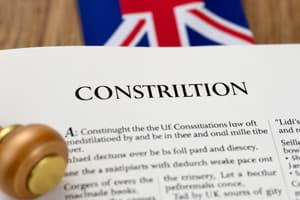Podcast
Questions and Answers
What is the primary characteristic of the UK's territorial constitution?
What is the primary characteristic of the UK's territorial constitution?
- It is based on a codified constitution.
- It operates as a typical federal state.
- It has a bicameral legislature.
- It is identified as a union state. (correct)
What does devolution entail in the context of the UK government?
What does devolution entail in the context of the UK government?
- The concentration of power in the central government.
- The elimination of regional governments.
- The transfer of powers to a subordinate elected body on a geographical basis. (correct)
- The establishment of a federal constitution.
Which of the following statements is true regarding the nature of the UK constitution?
Which of the following statements is true regarding the nature of the UK constitution?
- It allows for dual federal representation.
- It is a rigid and codified document.
- It lacks a formal codified constitution. (correct)
- It is designed to prevent any form of devolution.
What powers are specifically associated with devolution in the UK?
What powers are specifically associated with devolution in the UK?
How does devolution differ from typical federalism in regards to legislative authority?
How does devolution differ from typical federalism in regards to legislative authority?
What was a key requirement for a Bill under the EVEL procedure?
What was a key requirement for a Bill under the EVEL procedure?
What type of legislative competence was granted to the Welsh legislature following the Wales Act 2017?
What type of legislative competence was granted to the Welsh legislature following the Wales Act 2017?
Who ultimately resolves disputes related to legislative competence in the UK?
Who ultimately resolves disputes related to legislative competence in the UK?
What was the cited reason for the abolishment of the EVEL procedure in July 2021?
What was the cited reason for the abolishment of the EVEL procedure in July 2021?
What is implied by the concept of asymmetrical powers in the context of devolution?
What is implied by the concept of asymmetrical powers in the context of devolution?
What was a significant change brought by the Government of Wales Act 2006?
What was a significant change brought by the Government of Wales Act 2006?
What impeded the progress of devolution in Northern Ireland after the establishment of the Assembly?
What impeded the progress of devolution in Northern Ireland after the establishment of the Assembly?
What does the term 'reserved powers' refer to in the context of devolution in Wales after the Wales Act 2017?
What does the term 'reserved powers' refer to in the context of devolution in Wales after the Wales Act 2017?
What was a key outcome of the Scottish Independence Referendum in relation to England's legislative process?
What was a key outcome of the Scottish Independence Referendum in relation to England's legislative process?
Which legislative framework initially allowed the Welsh Government to only create secondary legislation?
Which legislative framework initially allowed the Welsh Government to only create secondary legislation?
What is the 'West Lothian question' concerned with?
What is the 'West Lothian question' concerned with?
What major change did the Northern Ireland devolution experience in 2007?
What major change did the Northern Ireland devolution experience in 2007?
What indicates the evolution of devolved powers in the UK over the last two decades?
What indicates the evolution of devolved powers in the UK over the last two decades?
Flashcards are hidden until you start studying
Study Notes
UK's Territorial Constitution
- The UK is a union state with devolved powers, but not a federal state.
- Power is distributed across local, regional, and national levels.
- Devolution in the UK is a form of “demand and supply” where the range of devolved powers has increased over time.
- The UK does not have a codified constitution.
Devolution
- Devolution is the transfer of power from a higher political authority (like the UK Parliament) to a lower one (like the Scottish Parliament).
- This transfer typically involves legislative and executive powers, meaning the ability to make laws and decisions within a defined framework.
Devolution to Wales
- The Government of Wales Act 1998 gave the Welsh Government limited power, only allowing for the creation of secondary legislation.
- The Government of Wales Act 2006 provided the Welsh Government with law-making powers, but required a referendum for approval.
- Wales Act 2017 brought Welsh devolution more in line with Scotland, focusing on conferred powers vs. reserved powers.
Devolution to Northern Ireland
- The Northern Ireland Act 1998 established the Northern Ireland Assembly, with a focus on power sharing.
- The Northern Ireland Assembly is headed by the Executive Committee and allows for devolved government.
- The peace process has impeded devolution progress.
- Direct rule from Westminster was imposed for five years after the Ulster Unionist party declined to share power with Sinn Fein.
- Devolution was restored in 2007.
Devolution to England
- England does not have devolved institutions like Scotland, Wales, and Northern Ireland.
- Greater London has a form of regional government with elected mayors.
- West Lothian question: concerns about whether MPs representing non-English constituencies should be able to vote on English-specific legislation.
- McKay Commission proposed a double-count procedure called EVEL (English Votes for English Laws) as a solution.
- EVEL was used until 2021, when the government cited complexity and delay as reasons for the decision.
EVEL Procedure
- EVEL required a majority of all MPs and a majority of English MPs to approve legislation that only applied to England.
- EVEL was discontinued in 2021.
Legislative Competence
- Scottish and NI legislatures have general legislative competence to legislate on any issue unless explicitly reserved.
- The Welsh legislature initially operated under a conferred powers model but transitioned to a general legislative competence model (reserved powers) in 2017.
- The UK Supreme Court ultimately resolves disputes over legislative competence.
Implications of Devolution
- Devolution has implications for democracy, legal & political constitutionalism, and the degree of legal protection for devolved entities.
- The Sewel convention states that Westminster should not legislate on devolved matters without the consent of the devolved legislature.
- Devolution has created a form of asymmetrical power within the UK, with different powers conferred upon different devolved entities.
- The legal protection of devolution is ultimately determined by the UK Supreme Court.
Studying That Suits You
Use AI to generate personalized quizzes and flashcards to suit your learning preferences.




